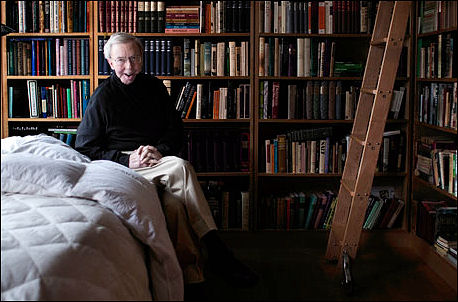Chris Jones‘ profile of Roger Ebert, one of the most perceptive and deeply moving pieces I’ve read about anyone, is in the current Esquire. Here are portions:

“Roger Ebert can’t remember the last thing he ate. He can’t remember the last thing he drank, either, or the last thing he said. Of course, those things existed; those lasts happened. They just didn’t happen with enough warning for him to have bothered committing them to memory — it wasn’t as though he sat down, knowingly, to his last supper or last cup of coffee or to whisper a last word into Chaz’s ear.
“The doctors told him they were going to give him back his ability to eat, drink, and talk. But the doctors were wrong, weren’t they? On some morning or afternoon or evening, sometime in 2006, Ebert took his last bite and sip, and he spoke his last word.
“He [once] lived his life through microphones. But now everything he says must be written, either first on his laptop and funneled through speakers or, as he usually prefers, on some kind of paper. His new life is lived through Times New Roman and chicken scratch. So many words, so much writing — it’s like a kind of explosion is taking place on the second floor of his brownstone.
“It’s not the food or the drink he worries about anymore, but how many more words he can get out in the time he has left. In this living room, lined with thousands more books, words are the single most valuable thing in the world. They are gold bricks.
“Here idle chatter doesn’t exist; that would be like lighting cigars with hundred-dollar bills. Here there are only sentences and paragraphs divided by section breaks. Every word has meaning. Even the simplest expressions take on higher power
“Ebert’s dreams are happier. Never yet a dream where I can’t talk, he writes on another Post-it note, peeling it off the top of the blue stack. Sometimes I discover — oh, I see! I CAN talk! I just forget to do it.
“In his dreams, his voice has never left. In his dreams, he can get out everything he didn’t get out during his waking hours: the thoughts that get trapped in paperless corners, the jokes he wanted to tell, the nuanced stories he can’t quite relate. In his dreams, he yells and chatters and whispers and exclaims. In his dreams, he’s never had cancer. In his dreams, he is whole.
“We have a habit of turning sentimental about celebrities who are struck down — Muhammad Ali, Christopher Reeve — transforming them into mystics; still, it’s almost impossible to sit beside Roger Ebert, lifting blue Post-it notes from his silk fingertips, and not feel as though he’s become something more than he was. He has those hands. And his wide and expressive eyes, despite everything, are almost always smiling.
“There is no need to pity me, he writes on a scrap of paper one afternoon after someone parting looks at him a little sadly. Look how happy I am.”
Let this become everyone’s motto, regardless of their situation: become an explosion. Do everything you can with every ounce of energy at your disposal in the time you have left.
Unless you’re an HE talk-back hater, in which case I would advise going home and turning on the TV and sitting down on your stained IKEA couch and stewing in your own juices. Because short of some amazing epiphany, that’s as good as it’s going to get for you.









